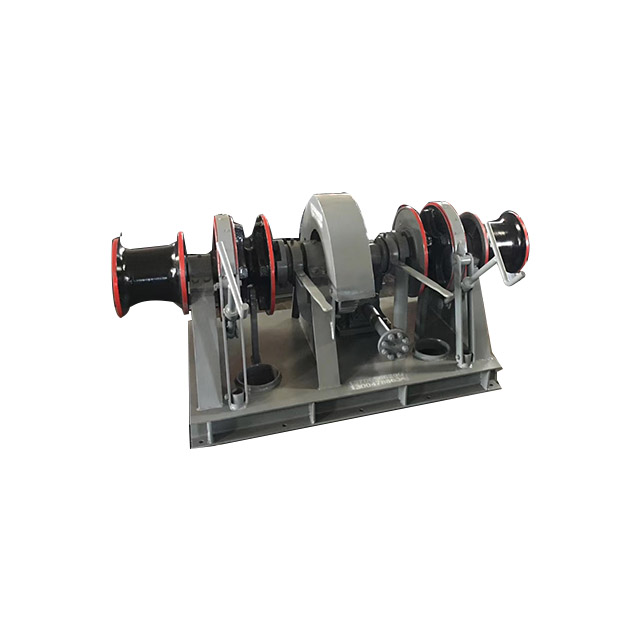Why Is Deck Machinery Essential for Efficient Maritime Operations?
2024-12-12
Deck machinery plays a crucial role in the daily operations of vessels, from cargo handling to anchoring and mooring. These machines are the unsung heroes of maritime activity, ensuring that tasks are carried out safely, efficiently, and reliably. But why is deck machinery so essential for modern maritime operations? Let’s dive into the various reasons why these machines are indispensable on ships and offshore platforms.
What Is Deck Machinery?
Deck machinery refers to a wide range of mechanical equipment installed on the deck of ships and offshore platforms, designed to support various operational tasks. These tasks include lifting and securing cargo, handling mooring lines, operating anchor winches, and even managing ballast systems. Common examples of deck machinery include winches, cranes, capstans, windlasses, and various types of handling gear.
These machines are designed to withstand harsh marine environments, such as saltwater, high humidity, and extreme weather conditions. As such, deck machinery needs to be both durable and reliable to ensure smooth operations, reduce downtime, and enhance safety.
Why Is Deck Machinery Important for Cargo Handling?
One of the primary functions of deck machinery is cargo handling. In both commercial shipping and offshore industries, the ability to load and unload cargo efficiently is vital to operational success. Cranes, winches, and other lifting devices are essential for lifting heavy cargo from the dock to the ship and vice versa.
Deck cranes, in particular, are often used for handling containers, heavy machinery, and other equipment that require precise movement and secure placement. For offshore platforms, deck machinery also supports the handling of drilling equipment, pipe laying, and even the transport of subsea systems, all of which are critical to the oil and gas industries.
Without well-maintained deck machinery, the process of cargo handling would become slower, more labor-intensive, and prone to errors, potentially resulting in costly delays or accidents.
Efficient Mooring and Anchoring
Mooring and anchoring are some of the most critical operations performed on the deck of a ship, whether it's in port or at sea. Deck machinery like anchor winches, capstans, and windlasses are used to secure the vessel safely to the dock or to anchor it in open water. These machines allow ships to maintain position, even in rough seas, and provide stability when loading and unloading cargo.
Anchor winches are used to handle the heavy anchor chains and secure the anchor to the seabed. Without efficient anchoring systems, ships may drift, potentially causing safety risks or damaging cargo. The ability to quickly and reliably deploy and retract anchors is essential to keeping operations on schedule, especially in high-traffic areas or during adverse weather conditions.
Safety and Risk Mitigation
Safety is always a priority in the maritime industry, and deck machinery plays an essential role in ensuring that operations are carried out safely. For example, winches and cranes are equipped with safety mechanisms to prevent overloading and malfunction, while capstans and windlasses ensure that mooring lines are secured properly.
Deck machinery also helps minimize manual labor, reducing the risk of accidents that can occur when workers handle heavy loads or perform tasks under strenuous conditions. With automated or remotely operated systems, workers are less exposed to dangerous situations, such as falling objects, snapped cables, or sudden movements.
In addition, deck machinery is often equipped with monitoring systems that track the health of the equipment. These systems can alert the crew to potential issues before they become serious, allowing for preventative maintenance and reducing the likelihood of unexpected failures that could jeopardize safety.
Durability and Weather Resistance
The maritime environment is tough on equipment. Deck machinery is exposed to the elements daily, enduring harsh conditions like saltwater corrosion, extreme temperatures, and high winds. As such, deck machinery is built to be robust and resistant to the wear and tear of maritime operations. Materials like stainless steel, aluminum, and specialized coatings are commonly used to ensure that equipment remains functional even in the most demanding environments.
Weather resistance is especially important for machinery that needs to function reliably in rough seas. For example, an anchor winch must work flawlessly regardless of weather conditions, ensuring the vessel remains anchored safely, even in a storm. Similarly, cranes used in cargo operations must operate efficiently under the most extreme conditions.
Versatility and Customization
Deck machinery is not a one-size-fits-all solution. Different vessels and operations require different equipment configurations. For example, a cargo ship might need a powerful deck crane to handle heavy containers, while an offshore drilling rig may require specialized handling equipment for subsea operations.
Many manufacturers offer customizable solutions for deck machinery, allowing shipowners and operators to choose the machinery best suited for their specific needs. This versatility ensures that deck machinery can be tailored to meet the demands of various maritime activities, from container shipping to offshore exploration.
Enhancing Operational Efficiency
Deck machinery significantly boosts the efficiency of maritime operations. By automating repetitive tasks like hoisting, securing, and positioning cargo, deck machinery frees up crew members to focus on more strategic tasks, improving overall productivity. This automation reduces the time required to complete certain operations, allowing ships to stay on schedule, optimize their routes, and reduce operational costs.
For example, an efficient mooring system can cut down the time required to dock a ship, improving turnaround times in port and allowing for faster loading and unloading of cargo. This translates to fewer delays and quicker time-to-market for goods, which is crucial in the highly competitive shipping industry.
Why Invest in High-Quality Deck Machinery?
Given the critical role that deck machinery plays in maritime operations, investing in high-quality equipment is essential. Poor-quality machinery can lead to breakdowns, increased downtime, and even safety incidents, all of which can be costly in terms of both time and money.
High-quality deck machinery not only offers durability and reliability but also provides long-term value. With proper maintenance and care, well-designed machinery can last for many years, providing efficient and secure service throughout its lifespan. Additionally, modern deck machinery often includes smart technologies, such as remote monitoring systems and automatic load detection, which improve efficiency and reduce human error.
Conclusion: Why Is Deck Machinery Essential for Maritime Operations?
Deck machinery is the backbone of many critical functions on ships, offshore platforms, and other marine vessels. From cargo handling and anchoring to ensuring safety and operational efficiency, these machines help keep maritime operations running smoothly and securely. With the ability to withstand harsh environments, provide automated support, and reduce human error, deck machinery is indispensable for ensuring that ships can carry out their tasks safely, efficiently, and on time.
In conclusion, whether you’re involved in shipping, offshore exploration, or any other maritime activity, deck machinery plays a vital role in the success of your operations. Investing in reliable, durable, and well-maintained equipment ensures smooth sailing for your vessel—both literally and figuratively.



